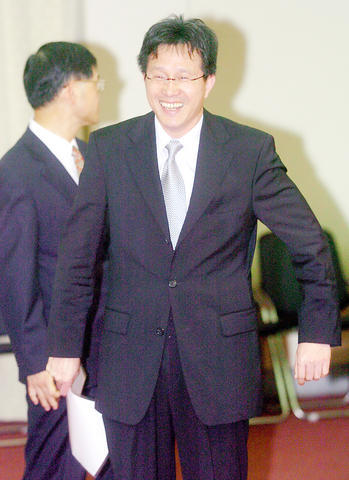Shieh Jhy-wey (
A diplomat who worked with Shieh in Germany where he served as Taiwan's representative, told the Taipei Times that Shieh is a person full of fresh ideas.
He is also someone who will immediately carry out an idea when this idea is practical, the official said.

PHOTO: CHEN TSE-MING, TAIPEI TIMES
"Since he first came here in 2005, he has tried hard to click with local people and local culture," the official said. "On one occasion Shieh selected a crowded street corner. Standing there, he began to introduce himself to people in fluent German and tried hard to bring their attention to Taiwan-related issues."
Born in Keelung on Jan. 6, 1955, he earned a bachelor's degree in German Literature from Soochow University in 1977 and a master's degree in German Literature from Fu-jen Catholic University in 1980.
He also obtained a doctorate in German Literature in 1987 from the Ruhr-University in Bochum, Germany.
Shieh's career background has mainly encompassed German education but he has also taken part in politics and the media.
After earning his doctorate in 1987, Shieh stayed in Germany to conduct further research until 1994.
He also taught German part-time at Soochow University and, starting in 1995, he taught German at both Soochow University and Fu-jen University.
Shieh became the director of Soochow University's School of Foreign Languages and Culture in 1996 and stayed in the post until 2002.
In 2003, he was a columnist for the Chinese-language Liberty Times (the Taipei Times' sister paper) and hosted a political talk show on TV.
Shieh began his involvement in Democratic Progressive Party (DPP) campaign activities in the 1990s.
He hosted campaign activities for President Chen Shui-bian (
A second generation Mainlander, Shieh, however, speaks fluent Taiwanese and enjoys speaking it.
Shieh has used his sense of humor to attract young people to become DPP members.
He has even rapped DPP policies. Crowds often burst into laughter at Shieh campaign events.
In 2002, the DPP government approached him and asked him whether he would accept an invitation to be the GIO minister but Shieh turned it down.
Since then Shieh has also been a regular on TV talk shows.
In 2005, he was appointed as the nation's representative to Germany.
Former Berlin mayor Wolfgang Luder told the Central News Agency (CNA) in an interview that Shieh did a good job as Taiwan's representative to Germany.
"His (Shieh) job was difficult but he could always overcome difficulties with his sense of humor and his remarkable fluency in German," Luder was quoted as saying in the interview. "I think it is quite difficult to find another qualified person to succeed Shieh. I hate to see him leave."
People First Party Legislator Chang Hsien-yao (
Before returning to Taipei, Shieh told the CNA in Berlin on Friday that he was quite confident about his new position because what he had been doing in Germany overlaps parts of his new job.
"As a representative here, it is my job to deliver the message to our German friends and continue to introduce Taiwan-related issues to them as well," he was quoted as saying. "I think this overlaps with the GIO minister's job description."
Saying that he has been away from home for two years, Shieh said it is good for him to have a chance to return home.
"I will come back [to Taiwan] with my experience as a diplomat and dedicate myself to the new job," he said.

Taiwanese can file complaints with the Tourism Administration to report travel agencies if their activities caused termination of a person’s citizenship, Mainland Affairs Council Minister Chiu Chui-cheng (邱垂正) said yesterday, after a podcaster highlighted a case in which a person’s citizenship was canceled for receiving a single-use Chinese passport to enter Russia. The council is aware of incidents in which people who signed up through Chinese travel agencies for tours of Russia were told they could obtain Russian visas and fast-track border clearance, Chiu told reporters on the sidelines of an event in Taipei. However, the travel agencies actually applied

New measures aimed at making Taiwan more attractive to foreign professionals came into effect this month, the National Development Council said yesterday. Among the changes, international students at Taiwanese universities would be able to work in Taiwan without a work permit in the two years after they graduate, explainer materials provided by the council said. In addition, foreign nationals who graduated from one of the world’s top 200 universities within the past five years can also apply for a two-year open work permit. Previously, those graduates would have needed to apply for a work permit using point-based criteria or have a Taiwanese company

The Shilin District Prosecutors’ Office yesterday indicted two Taiwanese and issued a wanted notice for Pete Liu (劉作虎), founder of Shenzhen-based smartphone manufacturer OnePlus Technology Co (萬普拉斯科技), for allegedly contravening the Act Governing Relations Between the People of the Taiwan Area and the Mainland Area (臺灣地區與大陸地區人民關係條例) by poaching 70 engineers in Taiwan. Liu allegedly traveled to Taiwan at the end of 2014 and met with a Taiwanese man surnamed Lin (林) to discuss establishing a mobile software research and development (R&D) team in Taiwan, prosecutors said. Without approval from the government, Lin, following Liu’s instructions, recruited more than 70 software

Chinese spouse and influencer Guan Guan’s (關關) residency permit has been revoked for repeatedly posting pro-China videos that threaten national security, the National Immigration Agency confirmed today. Guan Guan has said many controversial statements in her videos posted to Douyin (抖音), including “the red flag will soon be painted all over Taiwan” and “Taiwan is an inseparable part of China,” and expressing hope for expedited reunification. The agency last year received multiple reports alleging that Guan Guan had advocated for armed reunification. After verifying the reports, the agency last month issued a notice requiring her to appear and explain her actions. Guan